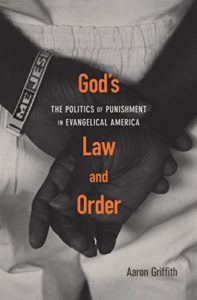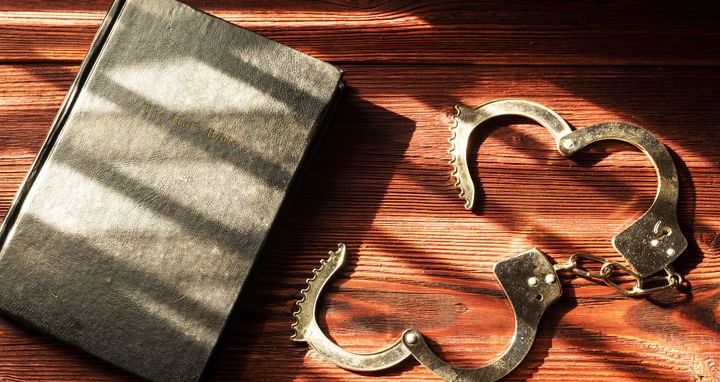Donald Trump’s infamous Bible photo-op in front of a church last June was an appeal to white evangelicals’ belief that crime, punishment and faith are intertwined, author and historian Aaron Griffith said.
That worldview came into even starker relief when law enforcement used tear gas to clear a square near St. John’s Church in Washington, D.C., so a scowling president could pose, Scriptures in hand.
“That moment encapsulates the linkage of religion and law and order, specifically within evangelical Christianity,” said Griffith, assistant professor of history at Sattler College in Boston. “That moment wasn’t about demonstrating a personal relationship with Jesus. Trump wanted to appeal to his base by confirming how law and order are religious.”
 Griffith explores these issues in his new book, God’s Law and Order: The Politics of Punishment in Evangelical America, scheduled for publication Nov. 10 by Harvard University Press.
Griffith explores these issues in his new book, God’s Law and Order: The Politics of Punishment in Evangelical America, scheduled for publication Nov. 10 by Harvard University Press.
Focusing mostly on the 20th century, Griffith documents the convergence of evangelical views of sin and crime with the development of the modern U.S. criminal justice system. It was, he said, a blending of theology and politics.
“Crime and punishment mattered so much for evangelicals because their religious outlook meshed well with important aspects of America’s penal culture,” he writes in the introduction. “For example, early postwar evangelicals saw religious value in emerging conceptions of crime, as when Billy Graham denounced American sin with reference to rising public concerns about juvenile delinquency.”
Fusing sinfulness and crime has in turn shaped evangelical attitudes toward criminals and government, thus opening the door to support for punitive measures, Griffith said in an interview. “When you equate crime with sin it becomes much easier to equate the state as an instrument of God’s wrath or an instrument of God’s justice in the world.”
But the marriage of theology and law-and-order values also generated a concern among evangelicals for the salvation and rehabilitation of inmates, Griffith said.

Aaron Griffith
That in turn fueled the rise of evangelical prison ministries. “By equating crime with sin, evangelicals could tap into what was a core part of their ministry: reaching those who need to hear the gospel.”
That impulse was on display when Trump pardoned an ex-felon during the 2020 Republican National Convention and when the president signed a bipartisan criminal justice reform act in 2018, Griffith said.
But the RNC also was laced with prayers of support for police, further cementing religious conservatives’ views of the punitive and rehabilitative functions of criminal justice, he noted. “Police and prisons are seen as sources of humanitarian intervention, even though they fail at that so often.”
Get-tough-on-crime laws also have failed to live up to claims of being colorblind with regard to race. Griffith said his book aims to show that self-proclaimed efforts at racially neutral polices have simply oppressed Blacks in deed, if not in word.
Get-tough-on-crime laws also have failed to live up to claims of being colorblind with regard to race.
“Someone might say, ‘This law doesn’t say anything about Black Americans.’ Or someone might say, ‘This police department has Black officers.’ Nevertheless, Black neighborhoods are policed a lot more than white neighborhoods,” he said.
The aftermath of George Floyd’s killing by a Minneapolis police officer helped illuminate evangelical attitudes toward race, law and order and faith, Griffith said. “Many white evangelical leaders who supported Donald Trump were clear that George Floyd’s death was unjust and an unjust use of force by a policeman.”
But they did not see the crime as a racial issue or as a result of discriminatory policing practices, he added. “I saw most white evangelical leaders say most police officers are not like that, that this is not how most police are.”
That worldview also clears the way for conservative Christian support for Trump’s draconian immigration policies, including the separation of children from their families at the border.
“There is very little sense of how the law is unjust.”
“So many Americans, especially evangelicals, will say they (immigrants) shouldn’t break the law, that they should follow the rules of coming to our country legally and that this is what happens when people don’t follow the law. There is very little sense of how the law is unjust,” Griffith said.
He believes a fixation on one New Testament chapter drives the rational for such support.
“Romans 13 has given Christians in America a wide berth to explain away a number of violent actions by the government, including incarcerating and separating children from their parents,” he said. “This gives a sacred quality to the law, which is part of the problem.”
Related articles:
USC study finds Blacks three times more likely to be stopped by police in LA County
Q&A with Chris Sanders on unions, social justice and policing
Beware when ‘law and order’ is cover for lawlessness and disorder


